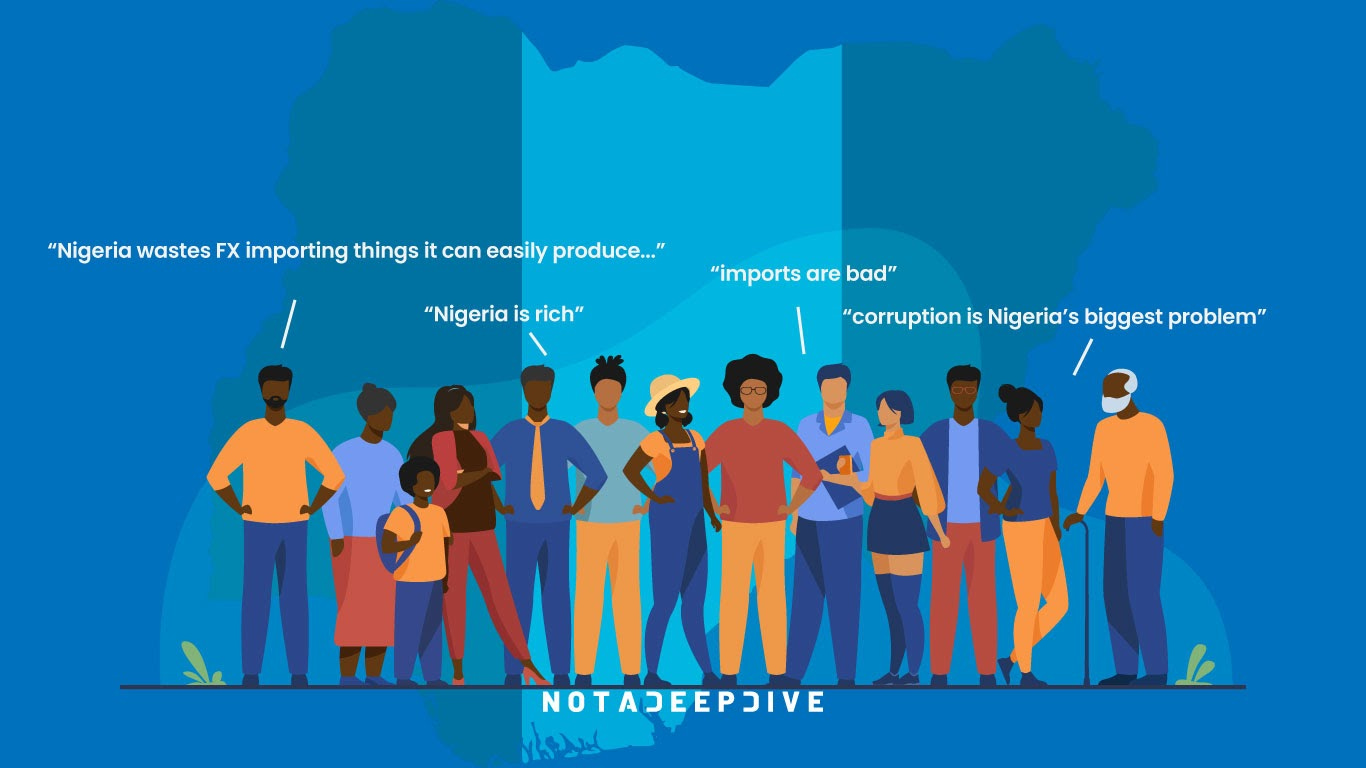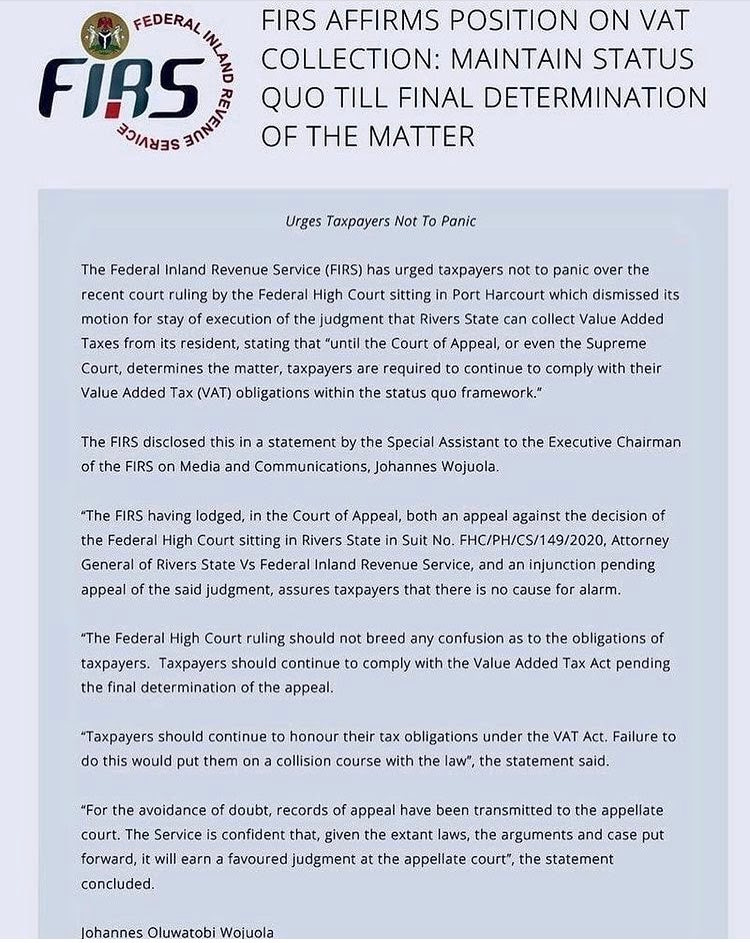A fight over taxes is just what Nigeria needs
Nigeria's curse is an addiction to bad economic ideas
“Crude oil is Nigeria’s curse” is something I’ve seen in a few articles and headlines. Given the impact crude oil has had on the Niger Delta region, I understand why people hold this opinion. Yet, I think Nigeria’s curse, if you believe in such things, is an addiction to bad economic ideas. “Nigeria is rich,” “corruption is Nigeria’s biggest problem, “imports are bad,” “Nigeria wastes FX importing things it can easily produce...” take your pick.
Believing these ideas can’t be that bad, right? Wrong! Some of these ideas lead to disastrous outcomes. For instance, in 2013, Nigeria’s minister for trade and investment led an automotive policy that raised the customs duty on used cars from 35% to 70%. The minister figured since Nigeria was spending ₦550bn annually on importing used cars, increasing customs duty would encourage local production of vehicles. Can you identify the bad economic idea in this situation?
Back to the present: Instead, car smuggling became big business, and vehicles became expensive. Vehicle sales in Nigeria have not recovered since 2014.
The lesson is that bans do not work; they make smugglers rich and things more expensive for ordinary citizens. If you need another example, there’s Nigeria’s border closure policy which Buhari and Emefiele said was a way to increase domestic food production. Instead, the policy led to 22% food inflation and a rise in food prices in less than two years. According to a World Bank report on Nigeria, “In 2020, food prices accounted for 63% of the total increase in inflation.”
See also: Are the big dogs slowing down?
Let’s consider another popular idea: Nigeria is a rich country with an expenditure/spending problem. Politicians are responsible for making this idea popular. It’s why I always say that you should never vote for any politician who thinks that Nigeria is rich. When they get elected, they will deal with the real issue: Nigeria doesn’t generate enough income.
Here are a few figures to consider:
Nigeria’s revenue target for 2020: ₦5.365 trillion
The total revenue earned in 2020: ₦3.93 trillion
Nigeria’s capital expenditure for 2020: ₦1.7 Trillion
The portion of income that went to debt servicing: ₦3.26 trillion or 82.9% of revenue
Nigeria’s total debt: ₦32.22 Trillion
What did those figures tell you? A) Nigeria has a revenue problem or B) Nigeria is neck-deep in debt?
Brace yourself; it’s about to get complex: If you answered B, you should know that Nigeria’s debt-to-GDP — a ratio of how much a country owes compared to its Gross Domestic product — is 29.17% (2019). In the USA, that figure is 105% (2017), South Africa’s stands at 62% (2019), and Ghana’s is 63.9% (2019). If those figures are confusing, it means that, while Nigeria’s debt has increased in the last five years, it is small compared to many countries. Despite this, we spend 83 Kobo of every Naira we earn servicing debts. So we’re right back to those two words: revenue problem.
The upside is that the Federal government is aware of the problem and has developed some creative solutions. For instance, the 2020 Finance Act allows the FG to borrow money in dormant bank accounts (estimated N737bn) and unclaimed dividends (estimated N158.4 bn) for up to six years. The FG has also discussed getting more people to pay taxes, a.k.a widening the tax net. This last one is not a new idea, there’s no year the Federal Inland Revenue Service (FIRS) has not promised to widen the tax net. Yet, as our friends at SBM Intelligence remind us, “you cannot use PowerPoint slides to expand the tax net.”
In any case, the FIRS now has bigger problems. In the last month, state governments say that they, and not the FG/FIRS, should collect Value Added Tax (VAT) and Personal Income Tax (PIT). There have been court judgments and journalists saying things like restructuring and fiscal federalism.
Instead of hitting you with more big words, here’s a simple breakdown of what all the recent tax wahala means.
A fight over taxes is what Nigeria needs
Nigeria’s Federal Government, which increased VAT from 5% to 7.5% last year, needs every penny it can get. Right now, the FG collects Company Income Tax (CIT) and VAT. While CIT is the more significant revenue source, VAT is also crucial — in 2020, Nigeria’s total VAT collection was about N1.53tr.
The FG collects VAT through the FIRS and then shares it: 50% to states, 35% to Local Governments, and 15% retained by the FG. This sharing arrangement is not great for the states with meagre VAT collection.
But other states with a larger contribution say that sharing doesn’t work for them. Lagos, for instance, accounts for 55% of Nigeria’s VAT, with FCT and Rivers adding 20% and 6%, respectively.
If Lagos and Rivers collect and keep all their VAT, it will boost their internally generated revenue. Lagos will not have to share its VAT, some of which is received from alcoholic beverages, with states that do not allow the sale of alcohol — I’m looking at you, Kano and Zamfara state.
How did we get here? A Federal High Court ruled that Rivers state, not the FIRS, should collect VAT in the state. Here are some highlights:
The FG cannot collect VAT, PIT, Withholding Tax, Education Tax and Technology Levy in any state of the federation.
This ruling is not the first time a Court is ruling that the FG does not have the powers to collect these taxes.
In 2020, a Federal High Court ruled in Ukala vs FIRS that the FG does not have the power to impose VAT.
The 2020 ruling was necessary because the VAT act, which the court said the National Assembly has no power to make, is the basis for which the FG collects VAT.
Why have the states waited so long to challenge VAT collection? Ukala vs FIRS was the first time the question of the powers of the FG to collect taxes came up. Immediately it was decided that the FG did not have those powers, Rivers state immediately saw the revenue opportunity.
What’s something no one is saying about the VAT ruling? The court noted that the FIRS knows that it doesn’t have powers to collect VAT. The court says that the FIRS wrote a letter to the National Assembly in June 2020 asking to sponsor a bill to amend the 1999 constitution. That amendment would have seen VAT added to matters only the Federal Government has control of.
Now this: Despite this week’s court ruling, the FIRS is refusing to budge. It said in a statement, “Taxpayers should continue to honour their tax obligations under the VAT Act. Failure to do this would put them on a collision course with the law.”
The FIRS statement asking taxpayers to maintain status quo is surprising because A) The FG has never had the powers to collect VAT, B) The court denied the FIRS motion asking Rivers to stop collecting VAT while it goes to the Court of Appeal.
Where does this leave the states? Lagos state government has joined the Rivers state suit at the Court of Appeal (as interested parties). It means that the decision of the Court of Appeal will also apply to Lagos.
TL;DR: After years of arguing that Nigerian states are too dependent on the FG, the law courts may force states to start thinking seriously. Will the poorer states step up and make policies that encourage businesses with no VAT freebies to rely on?
Got questions? Ask them in the comments section, and I’ll be sure to answer:
NO AUDIO LOVE - SHARE NOTADEEPDIVE .
Friends always tell friends about Notadeepdive, so click that button to share Notadeepdive with your network. The more, the merrier; so invite everyone you know and you’ll earn rewards for being so selflesss.
Celebrating Our Community!
For the rest of the year, we’re celebrating wins, big and small. Let us know how you, your friends, neighbours, and colleagues are making big moves, checking off goals, or helping your community. If you’re feeling like it, you can tell us about your birthday too. Email me: olumuyiwa@notadeepdive.com
Chichi (Abuja) says her first month at a new job after making a huge career move from Business Development to Risk and Compliance. Good luck with your new job!
To everyone else, see you on Friday!
*A big thanks to Tobi Balogun, who helped to clarify and simplify a lot of the legalese in today’s newsletter








Oh my thanks for this nice, simply put but very clear write up. i've been quite confused over what was going recently with regard to the vat issue and you broke them down so simple for a layman to understand. nice work
As good a development as this is, a lot of issues are still not clear. What happens to the 35% that is due to local governments?? In the present arrangement, I can’t see how a state like zamfara benefit from VAT collected in Lagos.